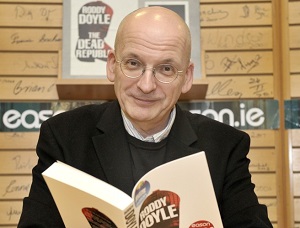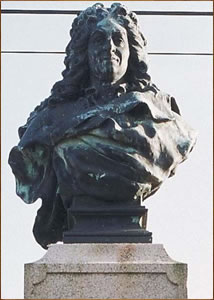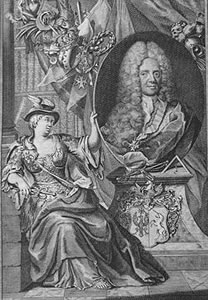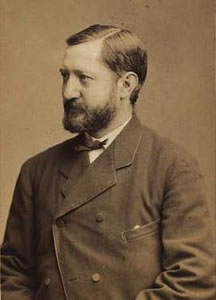De Ierse schrijver Roddy Doyle werd geboren in Dublin op 8 mei 1958. Zie ook alle tags voor Roddy Doyle op dit blog.
Uit: The Snapper
“–You’re wha’? said Jimmy Rabbitte Sr.
He said it loudly.
–You heard me, said Sharon.
Jimmy Jr was upstairs in the boys’ room doing his D.J. practice. Darren was in the front room watching Police Academy II on the video. Les was out. Tracy and Linda, the twins, were in the front room annoying Darren. Veronica, Mrs Rabbitte, was sitting opposite Jimmy Sr at the kitchen table.
Sharon was pregnant and she’d just told her father that she thought she was. She’d told her mother earlier, before the dinner.
-Oh — my Jaysis, said Jimmy Sr.
He looked at Veronica. She looked tired. He looked at Sharon again.
–That’s shockin’, he said.
Sharon said nothing.
–Are yeh sure? said Jimmy Sr.
–Yeah. Sort of.
–Wha’?
–Yeah.
Jimmy Sr wasn’t angry. He probably wouldn’t be either, but it all seemed very unfair.
–You’re only nineteen, he said.
–I’m twenty.
–You’re only twenty.
–I know what age I am, Daddy.
–Now, there’s no need to be gettin’ snotty, said Jimmy Sr.
–Sorry, said Sharon.
She nearly meant it.
–I’m the one tha’ should be gettin’ snotty, said Jimmy Sr.
Sharon made herself smile. She was happy with the way things were going so far.“

Roddy Doyle (Dublin, 8 mei 1958)
De Amerikaanse schrijver Thomas Pynchon werd op 8 mei 1937 geboren in Glen Cove, Long Island, New York. Zie ook alle tags voor Thomas Pynchon op dit blog.
Uit: V
„Dog into wolf, light into twilight, emptiness into waiting presence, here were your underage Marine barfing in the street, barmaid with a ship’s propeller tattooed on each buttock, one potential berserk studying the best technique for jumping through a plate glass window (when to scream Geronimo? before or after the glass breaks?), a drunken deck ape crying back in the alley because last time the SP’s caught him like this they put him in a strait jacket. Underfoot, now and again, came vibration in the sidewalk from an SP streetlights away, beating out a Hey Rube with his night stick; overhead, turning everybody’s face green and ugly, shone mercury-vapor lamps, receding in an asymmetric V to the east where it’s dark and there are no more bars. Arriving at the Sailor’s Grave, Profane found a small fight in progress between sailors and jarheads. He stood in the doorway a moment watching; then realizing he had one foot in the Grave anyway, dived out of the way of the fight and lay more or less doggo near the brass rail. “Why can’t man live in peace with his fellow man,” wondered a voice behind Profane’s left ear. It was Beatrice the barmaid, sweetheart of DesDiv 22, not to mention Profane’s old ship, the destroyer USS Scaffold. “Benny,” she cried. They became tender, meeting again after so long. Profane began to draw in the sawdust hearts, arrows through them, sea gulls carrying a banner in their beaks which read Dear Beatrice. The Scaffold-boat’s crew were absent, this tin can having got under way for the Mediterranean two evenings ago amid a storm of bitching from the crew which was heard out in the cloudy Roads (so the yarn went) like voices off a ghost ship; heard as far away as Little Creek. Accordingly, there were a few more barmaids than usual tonight, working tables all up and down East Main. For it’s said (and not without reason) that no sooner does a ship like the Scaffold single up all lines than certain Navy wives are out of their civvies and into barmaid uniforms, flexing their beer-carrying arms and practicing a hooker’s sweet smile; even as the N.O.B. band is playing “Auld Lang Syne” and the destroyers are blowing stacks in black flakes all over the cuckolds-to-be standing manly at attention, taking leave with rue and a tiny grin.”

Thomas Pynchon (Glen Cove, 8 mei 1937)
Down Town Glen Cove, Long Island
De Engelse schrijfster Pat Barker werd geboren in Thornaby-on-Tees op 8 mei 1943. Zie ook alle tags voor Pat Barker op dit blog.
Uit: Noonday
„Elinor was halfway up the drive when she sensed she was being watched. She stopped and scanned the upstairs windows—wide open in the heat as if the house were gasping for breath—but there was nobody looking down. Then, from the sycamore tree at the end of the gar- den, came a rustling of leaves. Oh, of course: Kenny. She was tempted to ignore him, but that seemed unkind, so she went across the lawn and peered up into the branches.
“Kenny?”
No reply. There was often no reply.
Kenny had arrived almost a year ago now, among the first batch of evacuees, and, although this area had since been reclassified—“neutral” rather than “safe”—here he remained. She felt his gaze heavy on the top of her head, like a hand, as she stood squinting up into the late-afternoon sunlight.
Kenny spent hours up there, not reading his comics, not building a tree house, not dropping conkers on people’s heads—no, just watching. He had a red notebook in which he wrote down car numbers, the time people arrived, the time they left . . . Of course, you forgot what it was like to be his age: probably every visitor was a German spy. Oh, and he ate himself, that was the other thing. He was forever nibbling his fingernails, tearing at his cuticles, picking scabs off his knees and licking up the blood. Even pulling hair out of his head and sucking it. And, despite being a year at the village school, he hadn’t made friends. But then, he was the sort of child who attracts bullying, she thought, guiltily conscious of her own failure to like him.
“Kenny? Isn’t it time for tea?”
Then, with a great crash of leaves and branches, he dropped at her feet and stood looking up at her, scowling, for all the world like a small, sour, angry crab apple.
“Where’s Paul?”
“I’m afraid he couldn’t come, he’s busy.”
“He’s always busy.”
“Well, yes, he’s got a lot to do. Are you coming in now?” Evidently that didn’t deserve a reply.
He turned his back on her and ran off through the arch into the kitchen garden.“
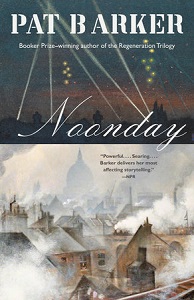
Pat Barker (Thornaby-on-Tees, 8 mei 1943)
Cover
De Amerikaanse dichter Gary Snyder werd geboren op 8 mei 1930 in San Francisco. Zie ook alle tags voor Gary Snyder op dit blog.
Above Pate Valley
We finished clearing the last
Section of trail by noon,
High on the ridge-side
Two thousand feet above the creek
Reached the pass, went on
Beyond the white pine groves,
Granite shoulders, to a small
Green meadow watered by the snow,
Edged with Aspen—sun
Straight high and blazing
But the air was cool.
Ate a cold fried trout in the
Trembling shadows. I spied
A glitter, and found a flake
Black volcanic glass—obsidian—
By a flower. Hands and knees
Pushing the Bear grass, thousands
Of arrowhead leavings over a
Hundred yards. Not one good
Head, just razor flakes
On a hill snowed all but summer,
A land of fat summer deer,
They came to camp. On their
Own trails. I followed my own
Trail here. Picked up the cold-drill,
Pick, singlejack, and sack
Of dynamite.
Ten thousand years.
Kyoto: March
A few light flakes of snow
Fall in the feeble sun;
Birds sing in the cold,
A warbler by the wall. The plum
Buds tight and chill soon bloom.
The moon begins first
Fourth, a faint slice west
At nightfall. Jupiter half-way
High at the end of night-
Meditation. The dove cry
Twangs like a bow.
At dawn Mt. Hiei dusted white
On top; in the clear air
Folds of all the gullied green
Hills around the town are sharp,
Breath stings. Beneath the roofs
Of frosty houses
Lovers part, from tangle warm
Of gentle bodies under quilt
And crack the icy water to the face
And wake and feed the children
And grandchildren that they love.
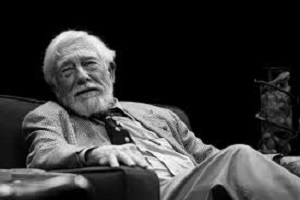
Gary Snyder (San Francisco, 8 mei 1930)
De Oostenrijkse schrijfster Gertrud Fussenegger werd geboren op 8 mei 1912 in Pilsen. Zie ook alle tags voor Gertrud Fussenegger op dit blog.
Uit: Das verschüttete Antlitz
„Damals war es Abend und Herbst.
Öde und unwirtlich sind die Hochflächen des
nordböhmischen Landes. Kahl sind sie, weil der Wind über sie hinfegt.Wo eine Straße läuft, stehen die dürren, schwarzberindeten Zwetschgenbäume in unabsehbaren Reihen. Die Bäche und Flüsse haben tiefe Täler ausgewaschen, dort drängt sich der Wald zu dichten Schöpfen zusammen, dort klappern Mühlen und rattern Sägen; dort werden in kleinen Fabriken baumwollene Strümpfe gewirkt und billiger Drell gewoben.
Auf steilen Kehren kriecht ein Omnibus zum Rand einer Schlucht empor. Er ist nicht groß, ein
schwärzlicher Kasten, der auf plumpen Rädern rumpelt. Der Motor tuckert, die Gänge kreischen. Oben auf der Ebene gewinnt er an Fahrt.
Drinnen ist es dunkel.DerWagen stößt und rüttelt, die Luft riecht süßlich nach Benzin, scharf und verdorben nach Atem und Kleiderdunst. Man ist schon eine Stunde unterwegs, irgendwo am Horizont schwimmen Lichter herauf, die Lampen einer größeren Ortschaft. Dort ist die Fahrt zu Ende. Aber zuvor hält der Wagen noch einmal an. Der Fahrer dreht das Licht auf.»AmWrschek«, sagt er. »Da wollte wer aussteigen.«
Auf der letzten Bank sitzt, in das Eck gelehnt, ein Mann und schläft. Der Hut ist ihm ins Gesicht gerutscht. »Der ist es«, ruft ein Knabe. »Der dort!« Jemand steht auf, stößt den Schlafenden an. »He – Sie!« Der Mann fährt empor. »AmWrschek! Da sind wir, aussteigen!«
»Wird’s bald?« murmelt der Fahrer ungeduldig.
Jemand beginnt zu kichern.Es ist immer lächerlich, wenn ein Mensch aus dem Schlaf geweckt wird und nicht begreift, was man von ihm will. Auch dieser Mensch wirkt lächerlich, er stiert ein paar Sekunden ganz verloren vor sich hin, dann schnellt er empor, schnellt sich vorwärts; der Gang zwischen den Sitzen ist mit Gepäck verrammelt, der Mann stolpert, die Leute grinsen. Endlich ist er vorn, da ruft eine Frau: »Ihren Mantel, Sie haben ja Ihren Mantel vergessen.« – Ach ja. Der Mann kehrt um. Er muß zurück, den Mantel vom Haken nehmen und wieder nach vorne gehen.Der Fahrer läßt den Motor wütend aufbrüllen, der Wagen zittert und stampft, als wäre auch er ungeduldig über den torkelnden Fahrgast. Kaum ist der hinaus, ruckt der Wagen an. Die Tür wird von innen zugeschlagen.“
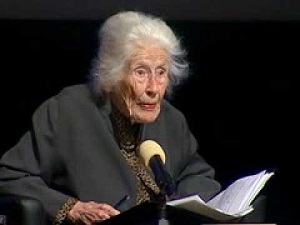
Gertrud Fussenegger (8 mei 1912 – 19 maart 2009)
De Amerikaanse schrijver en criticus Edmund Wilson werd geboren op 8 mei 1895 in Red Bank, New Jersey. Zie ook alle tags voor Edmund Wilson op dit blog.
Uit:The Sixties
“I set out to go to the memorial service for Louise Bogan at 3 at the National Institute [ of Arts and Letters ] ; but I stopped to see the doctor on the way and he told me I ought not to go, because I would give people my infection. So I went back to the club and went to bed. I was trying to read Conrad’s “Secret Agent” — very boring, full of the old-fashioned psychologizing of the Henry James era. Some of these novels of Conrad’s present a challenge to the reader to get through them. I had a similar experience with “Nostromo,” which I read part of in the hospital. [ Wilson had a heart attack in March. ] I was well enough on Saturday to go with [ the writer ] Penelope [ Gilliatt ] to Fellini’s “Satyricon” — long and elaborate, a rather unpleasant effect, a piling up of horrors and monstrosities. Naples, Fla., Winter 1972
At Wellfleet, before I left, I found myself surrounded by my books and other belongings, but was now alienated from them, couldn’t really connect with them. Uncomfortable. Talcottville, Spring 1972
T’ville, May 31-June 5. Rather a desolate stay: Mrs. Stabb, Mrs. Seelman nursing me.
Millers and Glyn Morris [ friends ] madly working for McGovern. Democrats up here in hiding, people in big places Republicans. Two movies: “Godfather” and “French Connection,” bang bang. Painful getting in and out of theaters. Ned Miller harangued me about diet as if he had had a religious conversion.”
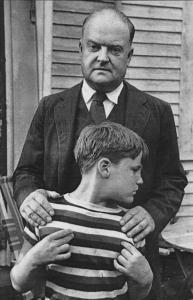
Edmund Wilson (8 mei 1895 – 14 juni 1972)
Hier met zijn zoontje Reuel in 1949
De Franse schrijver Alain-René Lesage werd geboren op 8 mei 1668 in Sarzeau. Zie ook alle tags voor Alain-René Lesage op dit blog.
Uit: Histoire de Gil Blas de Santillane
« A cette vue, qui me fit trembler pour le bien de l’Église, je m’arrêtais tout court ; je serrai promptement mes ducats, je tirai quelques réaux, et, m’approchant du chapeau disposé à recevoir la charité des fidèles effrayés, je les jetai dedans l’un après l’autre, pour montrer au soldat que j’en usais noblement. Il fut satisfait de ma générosité, et me donna autant de bénédictions que je donnai de coups de pied dans les flancs de ma mule, pour m’éloigner promptement de lui ; mais la maudite bête, trompant mon impatience, n’en alla pas plus vite. La longue habitude qu’elle avait de marcher pas à pas sous mon oncle lui avait fait perdre l’usage du galop.
Je ne tirai pas de cette aventure un augure trop favorable pour mon voyage. Je me représentai que je n’étais pas encore à Salamanque, et que je pourrais bien faire une plus mauvaise rencontre. Mon oncle me parut très imprudent de ne m’avoir pas mis entre les mains d’un muletier. C’était sans doute ce qu’il aurait dû faire ; mais il avait songé qu’en me donnant sa mule mon voyage me coûterait moins, et il avait plus pensé à cela qu’aux périls que je pouvais courir en chemin. Ainsi, pour réparer sa faute, je résolus, si j’avais le bonheur d’arriver à Peñaflor, d’y vendre ma mule, et de prendre la voie du muletier pour aller à Astorga, d’où je me rendrais à Salamanque par la même voiture. Quoique je ne fusse jamais sorti d’Oviédo, je n’ignorais pas le nom des villes par où je devais passer : je m’en étais fais instruire avant mon départ.
J’arrivai heureusement à Peñaflor : je m’arrêtai à la porte d’une hôtellerie d’assez bonne apparence. Je n’eus pas mis pied à terre, que l’hôte vint me recevoir fort civilement. Il détacha lui-même ma valise, la chargea sur ses épaules, et me conduisit à une chambre, pendant qu’un de ses valets menait ma mule à l’écurie. Cet hôte, le plus grand babillard des Asturies, et aussi prompt à conter sans nécessité ses propres affaires que curieux de savoir celles d’autrui, m’apprit qu’il se nommait André Corcuelo ; qu’il avait servi longtemps dans les armées du roi en qualité de sergent, et que, depuis quinze moins, il avait quitté le service pour épouser une fille de Castropol qui, bien que tant soit peu basanée, ne laissait pas de faire valoir le bouchon.”
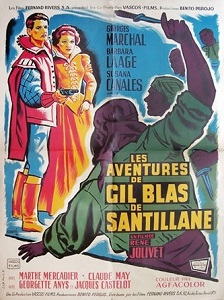
Alain-René Lesage (8 mei 1668 – 17 november 1747)
Cover
De Deense schrijver Sophus Schandorph werd geboren op 8 mei 1836 in Ringstedt. Zie ook alle tags voor Sophus Schandorph op dit blog.
Uit: Stina Becomes a Farmer’s Wife (Vertaald door Sally Ryan)
“Why, that’s a darned shame,” said the farmer. But when Stina continued holding the bread toward him, he took it with an attempt to be polite–”Those are really very fine sandwiches.” He half rose in the seat and began to fumble in his coat-tail pocket. As his arms were short, he had some trouble in hauling out a black, hammered pint bottle. A blue checked cotton handkerchief came out with it
. “Shall we make the nightingale chirp?” he asked, chuckling inwardly without moving his lips. He produced a strident noise by rubbing the moist cork against the bottle, which he then offered to Stina. She gave him an indignant glance and rejected the proffered bottle by a gesture. The farmer laughed as before, and said, “Why–it ain’t brandy. It’s sweet punch extract.”
This information altered matters. Stina took a swallow from the bottle, and grunted something which was meant to be thanks. The man took a long pull, and exclaimed with voluptuous delight, “Ah–ah–that cools one off a sight in such a heat. It’s a tidy drink.”
Stina nodded and licked her lips. A much softer “Ah” than that of the man was evidence of the enjoyment which the sweet drink had given her.
They continued their ride over the white road, without the least change in the surroundings or the situation. A couple of times the farmer moved nearer to Stina, as if by way of experiment, but each time she squeezed farther into the opposite corner of the seat.
They came to a hill. Now the horses had to walk slowly. From the top of the hill a village could be seen, topped by the white church tower with tiled, white-washed step-gables. Here and there were some farms, separated from the road by dunghills and blackish brown pools of water.
“Whoa !” said Stina when they had reached a cottage with green window-frames and a wilted rose-bush growing along the wall.
“Oh, is that where it is?” said the farmer. “Whoa! Do you understand Danish, you red fox ?”
This latter remark was addressed to the near horse, which had not been willing to obey orders at once, but seemed impressed by this appeal to its nationality.
A little girl in a pink calico dress appeared in the door, which consisted of an upper and a lower part, both open.”
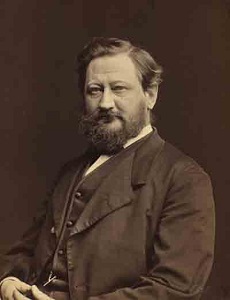
Sophus Schandorph (8 mei 1836 – 1 januari 1901)
Portret door P.S. Krøyer, 1895
De Franse schrijver, vertaler regisseur en diplomaat Romain Gary werd geboren op 8 mei 1914 in Vilnius, Litouwen. Zie ook alle tags voor Romain Gary op dit blog.
Uit: La vie devant soi
« L’entrée de l’immeuble menait à un deuxième immeuble, plus petit à l’intérieur et dès que j’y suis entré, j’ai entendu des coups de feu, des freins qui grinçaient, une femme qui hurlait et un homme qui suppliait « Ne me tuez pas ! Ne me tuez pas! » et j’ai même sauté en l’air tellement c’était trop près. Il y a eu tout de suite une rafale de mitraillette et l’homme a crié « Non! », comme toujours lorsqu’on meurt sans plaisir. Ensuite il y a eu un silence encore plus affreux et c’est là que vous n’allez pas me croire. Tout a recommencé comme avant, avec le même mec qui ne voulait pas être tué parce qu’il avait ses raisons et la mitraillette qui ne l’écoutait pas. Il a recommencé trois fois à mourir malgré lui comme si c’était un salaud comme c’est pas permis et qu’il fallait le faire mourir trois fois pour l’exemple. Il y eut un nouveau silence pendant lequel il est resté mort et puis ils se sont acharnés sur lui une quatrième fois et une cinquième et à la fin il me faisait même pitié parce qu’enfin tout de même. Après ils l’ont laissé tranquille et il y eut une voix de femme qui a dit « mon amour, mon pauvre amour », mais d’une voix tellement émue et avec ses sentiments les plus sincères que j’en suis resté comme deux ronds de flan et pourtant je ne sais même pas ce que ça veut dire. Il n’y avait personne dans l’entrée sauf moi et une porte avec une lampe rouge allumée. Je suis à peine revenu de l’émotion qu’ils ont recommencé tout le bordel avec « mon amour, mon amour » mais chaque fois sur un autre ton, et puis ils ont remis ça encore et encore. Le mec a dû mourir cinq ou six fois dans les bras de sa bonne femme tellement c’était pour lui le pied de sentir qu’il y avait là quelqu’un à qui ça faisait de la peine. »

Romain Gary (8 mei 1914 – 2 december 1980)
Cover
Zie voor nog meer schrijvers van de 8e mei ook mijn blog van 8 mei 2016 deel 3.

